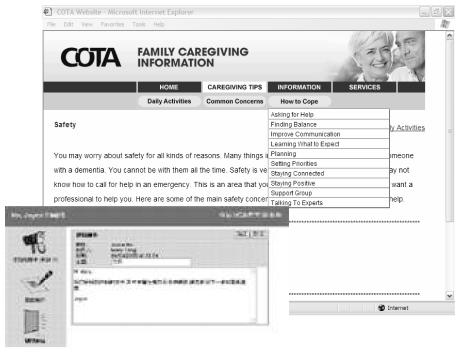Abstract
This poster reports on the developmental phase of a new internet-based support services (ICSS) for Chinese caregivers of people with Alzheimer Disease (AD): a specialized email application and an informational website. Bilingual Chinese caregivers wanted internet-based information in both Chinese and English. Usability testing and heuristic evaluation results revealed that the interface successfully supported the core functionality, but can be refined to improve usability.
Purpose
The ICSS consists of an information website and specialized email support. The website contains over 400 pages of disease-specific, caregiving, and community resources information in both Chinese and English1. The personalized email tool enables caregivers to receive occupational therapy (OTs) and social work (SWs) services at a time and from a distance that is convenient to them, using a language of their choice. This poster reports on the preliminary results on the feasibility and usability of the service.
Methodology
Three bilingual Chinese caregivers participated in a usability test. Participants were asked to think aloud as they performed the test tasks on the core aspects of the service; for example, sending and receiving messages, and browsing for relevant information. They completed a questionnaire that assessed internet usage and online caregiving service preferences. Finally, an expert review (heuristic evaluation) was conducted.
Results
One female and two male caregivers, aged 40s and 50s, took part in the study. They provided mild to heavy care to their family members for a short to long-term time period. They were moderate-to-heavy internet and email users. All wanted internet-based information to get practical caregiving suggestions. They preferred to use a combination of Chinese and English for online communication.
The usability testing and heuristic evaluation revealed that the interface supported core functionality. Large icons in the email interface representing check-inbox, sending and logout functionality facilitated understanding and target selection. The text and structured hyperlinks on the website’s homepage provided context to facilitate understanding and browsing. Redesign suggestions were identified to improve the layout and functionality. Subsequent system modifications included: enhanced feedback for errors, reorganization of the information to match caregivers’ expected categorisation, and more features such as a search function and saving draft emails to improve control and efficiency of use.
Conclusion
Many family caregivers cannot access professional services because of time constraints and language barriers2. ICSS has the potential to bridge this service gap. Preliminary findings found that Chinese caregivers wanted online services and preferred information in both Chinese and English. It is expected that refinements of the system would enhance its usability and ease-of-use for caregivers to access information and receive personalized services from OTs/SWs.
Contributor Information
T. Chiu, COTA Health & University of Toronto, Toronto.
D. Lottridge, University of Toronto, Toronto.
References
- 1.Chiu T, Gruneir M. Online Caregiver Support Services for Family Caregivers. The GTA Rehabilitation Network Best Practices Day Conference, Toronto, Canada: 2005. http://www.gtarehabnetwork.ca/bpd2005abstracts.asp
- 2.Chow TW, Ross L, Fox P, Cummings JL, Lin KM. Utilization of Alzheimer’s disease community resources by Asian-Americans in California. Int J Ger Psy. 2000;15 (9):838–847. doi: 10.1002/1099-1166(200009)15:9<838::aid-gps209>3.0.co;2-u. [DOI] [PMC free article] [PubMed] [Google Scholar]



